Module 9 Population Unit 3 Language in use课件35张
文档属性
| 名称 | Module 9 Population Unit 3 Language in use课件35张 |  | |
| 格式 | pptx | ||
| 文件大小 | 3.0MB | ||
| 资源类型 | 教案 | ||
| 版本资源 | 外研版 | ||
| 科目 | 英语 | ||
| 更新时间 | 2021-02-20 16:46:04 | ||
图片预览


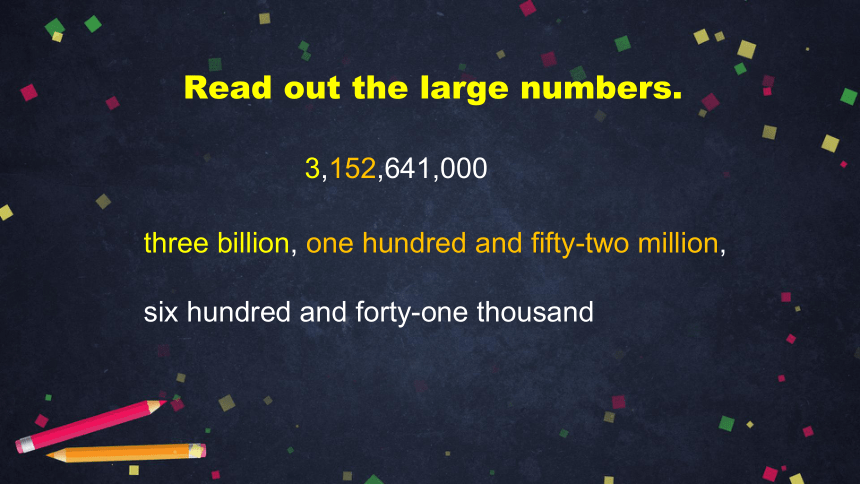
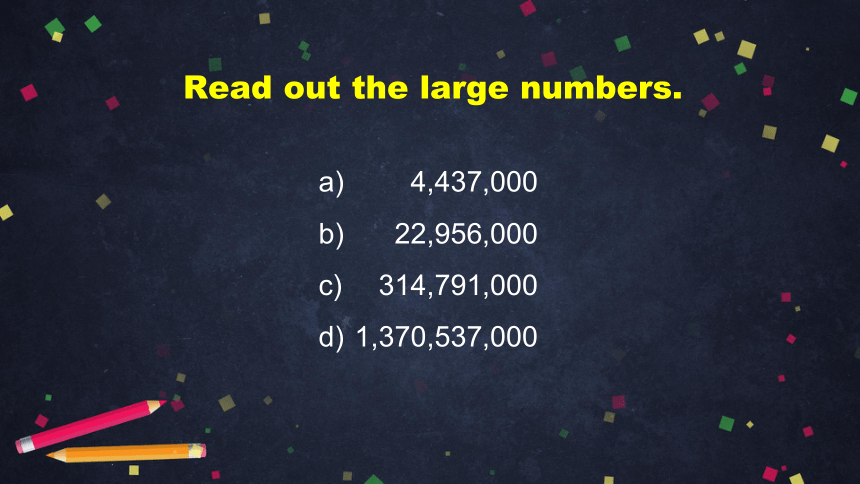
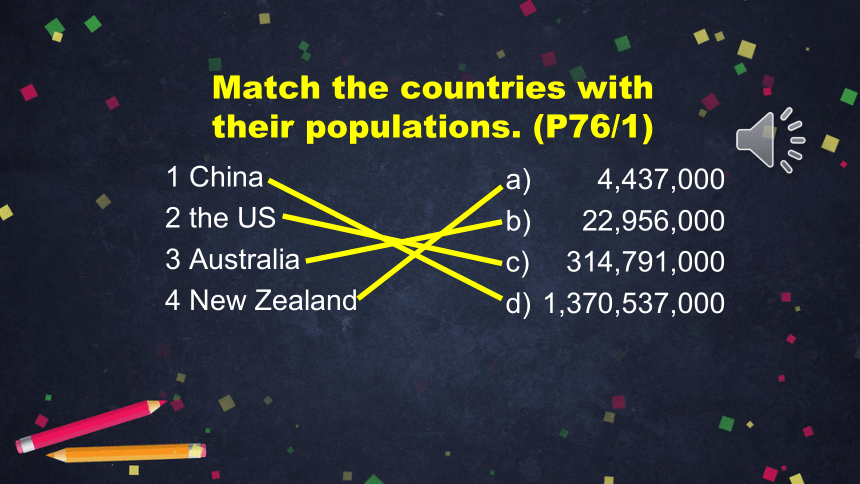

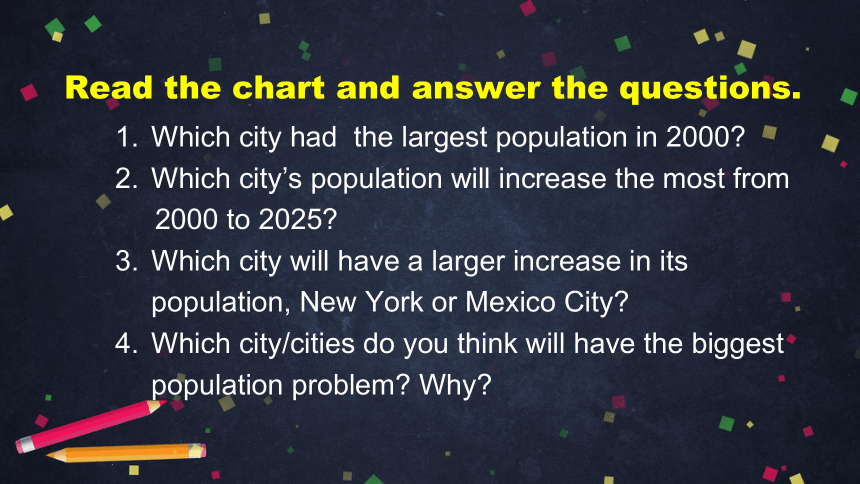
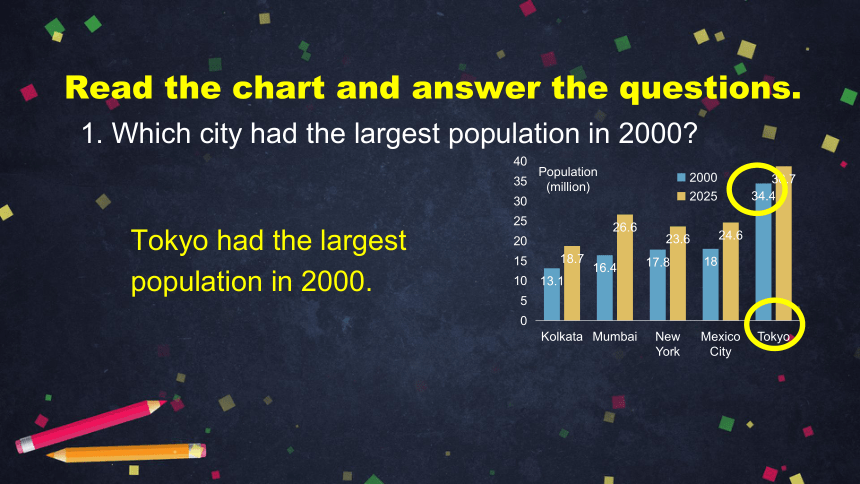
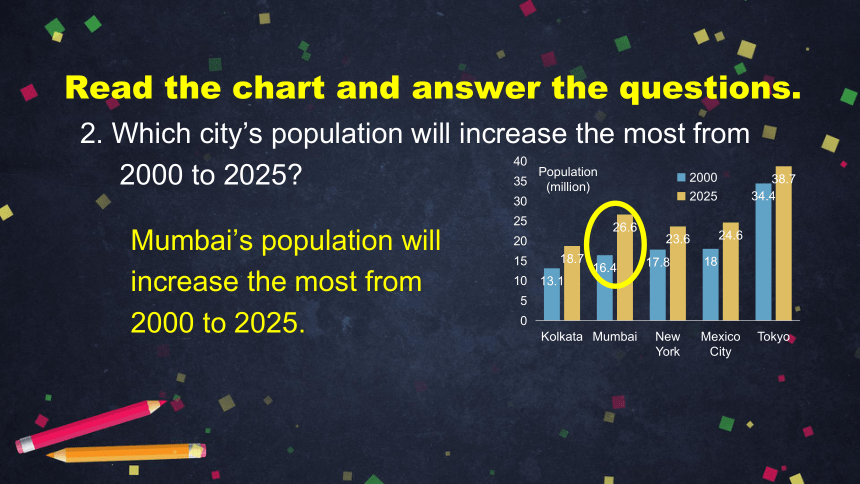
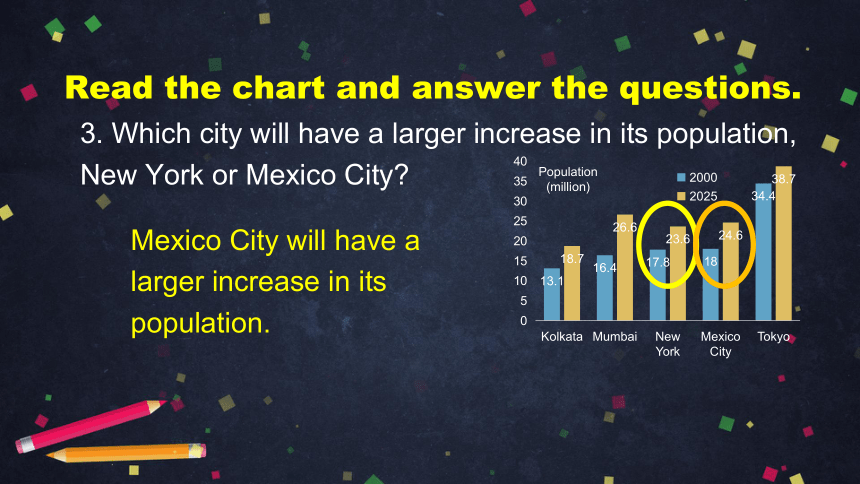

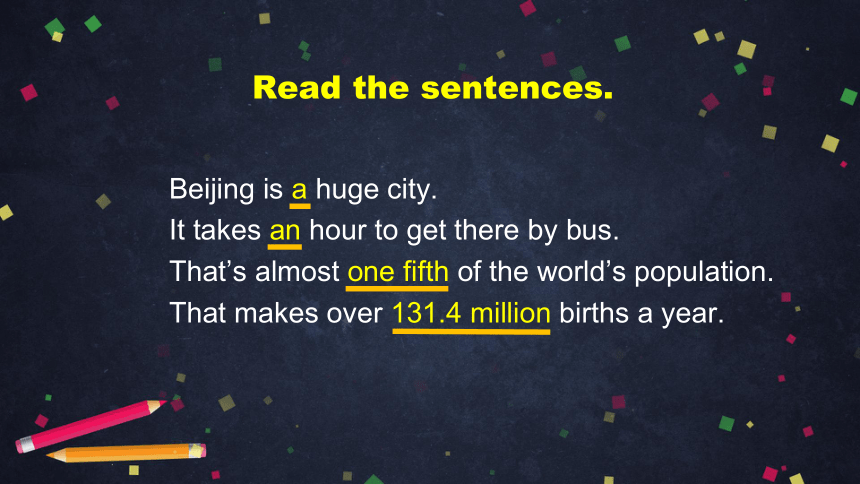
文档简介
M9 Unit 3 Language in use
初二年级 英语
1,000
2,000,000
3,000,000,000
Read out the large numbers.
a thousand
two million
three billion
hundred
thousand
million
billion
3,152,641,000
Read out the large numbers.
three billion, one hundred and fifty-two million,
six hundred and forty-one thousand
4,437,000
22,956,000
314,791,000
1,370,537,000
Read out the large numbers.
4,437,000
22,956,000
314,791,000
1,370,537,000
Match the countries with
their populations. (P76/1)
1 China
2 the US
3 Australia
4 New Zealand
Read the chart and answer the questions.
Read the chart and answer the questions.
Which city had the largest population in 2000?
Which city’s population will increase the most from
2000 to 2025?
Which city will have a larger increase in its population, New York or Mexico City?
Which city/cities do you think will have the biggest population problem? Why?
Read the chart and answer the questions.
1. Which city had the largest population in 2000?
Tokyo had the largest population in 2000.
Read the chart and answer the questions.
2. Which city’s population will increase the most from
2000 to 2025?
Mumbai’s population will increase the most from 2000 to 2025.
Read the chart and answer the questions.
Mexico City will have a larger increase in its population.
3. Which city will have a larger increase in its population, New York or Mexico City?
Read the chart and answer the questions.
4. Which city/cities do you think will have the biggest
population problem? Why?
I think Mumbai will have the biggest population problem because its population will increase the fastest.
What is your own opinion?
Read the sentences.
Beijing is a huge city.
It takes an hour to get there by bus.
That’s almost one fifth of the world’s population.
That makes over 131.4 million births a year.
Beijing is a huge city.
I go to the cinema once a month.
I had a good time in the party.
4. An apple a day keeps doctors away.
5. It takes an hour to get there by bus.
首次提到某人某物,不定冠词起介绍作用。
表示“每一”的概念,相当于every。
固定短语。
Articles - a/an
It takes an hour to get there by bus.
Take umbrella with you, it is going to rain.
Tony is going to university next month.
an 用在以元音音素开头的单词前
Articles - a/an
[?au?]
[?m?brel?]
[?ju?n??v??s?ti]
an
a
I have a dog and a cat. The dog is brown and the cat is black.
I had to write the report twice last term!
China has the largest population in the world.
指前文提到过的人或物,或特指某人或某物。
指谈话双方都知道的人或物。
用于序数词以及形容词最高级之前。
Articles - the
1. We have Chinese, maths and English on Friday in May .
2. Her handbag is in that car.
3. Maybe I should go to school by taxi.
在球类运动、学科名称前以及月份、星期前不用冠词。
如果名词前已有指示代词、物主代词、不定代词或
数词等作定语,则其前面不再用冠词。
在固定词组和习惯用语中。
Articles - no articles
Mina is (1) eighteen-year-old girl. She has got
(2) brother and (3) sister. Mina is (4) oldest child in (5) family. She lives in (6) very big city.
She has (7) job in (8) hotel. She hopes that one day she will have (9) chance to go to (10) college.
the
an
Complete the passage with a, an, the or / where necessary. (P77/4)
the
a
a
a
a
/
a
a
Complete the diagram showing population problems. Use the words in the box to help you. (P77/6)
air city countryside
hospital increase public
service traffic water
Problems of Arnwick
People move from
the countryside/Parkville.
People arrive in
the city.
Problem: Population
increases.
Environmental
problems
Examples:
air pollution
water pollution
too much traffic
Health
problems
Examples:
not enough
hospitals
Problems for the
government
Examples:
need more schools/buses
need better public services
need more police
Complete the passage. (P78/7)
countryside pollution population space traffic
Our world is facing many problems. Two of the biggest are
increasing population and pollution.
Complete the passage. (P78/7)
countryside pollution population space traffic
The (1) of the world is increasing quickly. Why is
this happening? Because more babies are born every year and
people also live longer. Many people are leaving the (2)
to work in the cities, but there is not enough (3)
for so many people.
population
countryside
space
Complete the passage. (P78/7)
countryside pollution population space traffic
Another huge problem for the world is (4) . There is
so much (5) on the roads that in some cities the air is
heavily polluted. We should work harder to protect our world.
traffic
pollution
Joining a car club is cheaper / more expensive than having a personal car.
People in car clubs pay for / do not pay for a car when they drive.
People in car clubs sometimes / never take a bus or ride a bike.
People in car clubs probably are / are not healthier.
Listen and choose
the correct answer. (P78/10)
a) It is cheaper to share a car than to have a personal car.
b) People in a car club do not often take buses, trains or the
underground.
c) There are no car clubs in the US.
d) Joining car clubs is good for you and for the city.
Listen again and choose the best summary. (P78/9)
a) It is cheaper to share a car than to have a personal car.
b) People in a car club do not often take buses, trains or the
underground.
c) There are no car clubs in the US.
d) Joining car clubs is good for you and for the city.
Choose the best summary. (P78/9)
You can use a car when you want to, and it’s cheaper than having a personal car.
You don’t always use the car because sometimes you can take a bus, or walk or ride a bike.
There are many car clubs in the US.
This is healthier for the city, as there will be fewer cars on the road. It is also healthier for you.
Topic sentence:
Joining car clubs is a good way to get around in cities.
Supporting details:
1. You can use it when you want to.
2. It’s cheaper.
3. It is healthier for the city.
4. It is healthier for you.
a) It is cheaper to share a car than to have a personal car.
b) People in a car club do not often take buses, trains or the
underground.
c) There are no car clubs in the US.
d) Joining car clubs is good for you and for the city.
Choose the best summary. (P78/9)
√
Do you think car clubs would be popular in China? Why/Why not?
Think and discuss. (P79/11)
I think car clubs would be popular in China. Because sharing cars are cheaper and more environmentally-friendly.
I don’t think car clubs would be very popular in China. Because owning a car is more convenient, we can go anywhere whenever we want. We can decorate our cars in our own way.
Choose a country or town which interests you.
Make a graph and research the population. (P79/12)
China.
Decide the points of time you want to look at.
1950, 1970, 1990, 2010, 2030.
Research the population of your place in those years.
Write your notes carefully.
1950 554,419,268
1970 827,601,385
1990 1,176,883,681
2010 1,368,810,604
2030 1,464,340,149
Make your graph. (P79/13)
Decide how you want to make your graph.
Population
(billion)
Write a paragraph. (P79/14)
In the graph, we can see how the population of China changed between 1950 and 2030. The graph shows in 1950, the population of China was 554,000,000. The population increased by almost one billion in one hundred years. Especially from 1970 to 1990, it increased from 828,000,000 to 1,177,000,000. But after 2010, the population stopped growing that fast. The population of China in 2030 will probably be 1,464,000,000 .
1.朗读课本第79页Around the world;
2.完成课本第77页练习题5和第78页练习题8;
3.绘制图表统计某一地区人口,并撰写一篇相关报告。
Homework
Thank you!
初二年级 英语
1,000
2,000,000
3,000,000,000
Read out the large numbers.
a thousand
two million
three billion
hundred
thousand
million
billion
3,152,641,000
Read out the large numbers.
three billion, one hundred and fifty-two million,
six hundred and forty-one thousand
4,437,000
22,956,000
314,791,000
1,370,537,000
Read out the large numbers.
4,437,000
22,956,000
314,791,000
1,370,537,000
Match the countries with
their populations. (P76/1)
1 China
2 the US
3 Australia
4 New Zealand
Read the chart and answer the questions.
Read the chart and answer the questions.
Which city had the largest population in 2000?
Which city’s population will increase the most from
2000 to 2025?
Which city will have a larger increase in its population, New York or Mexico City?
Which city/cities do you think will have the biggest population problem? Why?
Read the chart and answer the questions.
1. Which city had the largest population in 2000?
Tokyo had the largest population in 2000.
Read the chart and answer the questions.
2. Which city’s population will increase the most from
2000 to 2025?
Mumbai’s population will increase the most from 2000 to 2025.
Read the chart and answer the questions.
Mexico City will have a larger increase in its population.
3. Which city will have a larger increase in its population, New York or Mexico City?
Read the chart and answer the questions.
4. Which city/cities do you think will have the biggest
population problem? Why?
I think Mumbai will have the biggest population problem because its population will increase the fastest.
What is your own opinion?
Read the sentences.
Beijing is a huge city.
It takes an hour to get there by bus.
That’s almost one fifth of the world’s population.
That makes over 131.4 million births a year.
Beijing is a huge city.
I go to the cinema once a month.
I had a good time in the party.
4. An apple a day keeps doctors away.
5. It takes an hour to get there by bus.
首次提到某人某物,不定冠词起介绍作用。
表示“每一”的概念,相当于every。
固定短语。
Articles - a/an
It takes an hour to get there by bus.
Take umbrella with you, it is going to rain.
Tony is going to university next month.
an 用在以元音音素开头的单词前
Articles - a/an
[?au?]
[?m?brel?]
[?ju?n??v??s?ti]
an
a
I have a dog and a cat. The dog is brown and the cat is black.
I had to write the report twice last term!
China has the largest population in the world.
指前文提到过的人或物,或特指某人或某物。
指谈话双方都知道的人或物。
用于序数词以及形容词最高级之前。
Articles - the
1. We have Chinese, maths and English on Friday in May .
2. Her handbag is in that car.
3. Maybe I should go to school by taxi.
在球类运动、学科名称前以及月份、星期前不用冠词。
如果名词前已有指示代词、物主代词、不定代词或
数词等作定语,则其前面不再用冠词。
在固定词组和习惯用语中。
Articles - no articles
Mina is (1) eighteen-year-old girl. She has got
(2) brother and (3) sister. Mina is (4) oldest child in (5) family. She lives in (6) very big city.
She has (7) job in (8) hotel. She hopes that one day she will have (9) chance to go to (10) college.
the
an
Complete the passage with a, an, the or / where necessary. (P77/4)
the
a
a
a
a
/
a
a
Complete the diagram showing population problems. Use the words in the box to help you. (P77/6)
air city countryside
hospital increase public
service traffic water
Problems of Arnwick
People move from
the countryside/Parkville.
People arrive in
the city.
Problem: Population
increases.
Environmental
problems
Examples:
air pollution
water pollution
too much traffic
Health
problems
Examples:
not enough
hospitals
Problems for the
government
Examples:
need more schools/buses
need better public services
need more police
Complete the passage. (P78/7)
countryside pollution population space traffic
Our world is facing many problems. Two of the biggest are
increasing population and pollution.
Complete the passage. (P78/7)
countryside pollution population space traffic
The (1) of the world is increasing quickly. Why is
this happening? Because more babies are born every year and
people also live longer. Many people are leaving the (2)
to work in the cities, but there is not enough (3)
for so many people.
population
countryside
space
Complete the passage. (P78/7)
countryside pollution population space traffic
Another huge problem for the world is (4) . There is
so much (5) on the roads that in some cities the air is
heavily polluted. We should work harder to protect our world.
traffic
pollution
Joining a car club is cheaper / more expensive than having a personal car.
People in car clubs pay for / do not pay for a car when they drive.
People in car clubs sometimes / never take a bus or ride a bike.
People in car clubs probably are / are not healthier.
Listen and choose
the correct answer. (P78/10)
a) It is cheaper to share a car than to have a personal car.
b) People in a car club do not often take buses, trains or the
underground.
c) There are no car clubs in the US.
d) Joining car clubs is good for you and for the city.
Listen again and choose the best summary. (P78/9)
a) It is cheaper to share a car than to have a personal car.
b) People in a car club do not often take buses, trains or the
underground.
c) There are no car clubs in the US.
d) Joining car clubs is good for you and for the city.
Choose the best summary. (P78/9)
You can use a car when you want to, and it’s cheaper than having a personal car.
You don’t always use the car because sometimes you can take a bus, or walk or ride a bike.
There are many car clubs in the US.
This is healthier for the city, as there will be fewer cars on the road. It is also healthier for you.
Topic sentence:
Joining car clubs is a good way to get around in cities.
Supporting details:
1. You can use it when you want to.
2. It’s cheaper.
3. It is healthier for the city.
4. It is healthier for you.
a) It is cheaper to share a car than to have a personal car.
b) People in a car club do not often take buses, trains or the
underground.
c) There are no car clubs in the US.
d) Joining car clubs is good for you and for the city.
Choose the best summary. (P78/9)
√
Do you think car clubs would be popular in China? Why/Why not?
Think and discuss. (P79/11)
I think car clubs would be popular in China. Because sharing cars are cheaper and more environmentally-friendly.
I don’t think car clubs would be very popular in China. Because owning a car is more convenient, we can go anywhere whenever we want. We can decorate our cars in our own way.
Choose a country or town which interests you.
Make a graph and research the population. (P79/12)
China.
Decide the points of time you want to look at.
1950, 1970, 1990, 2010, 2030.
Research the population of your place in those years.
Write your notes carefully.
1950 554,419,268
1970 827,601,385
1990 1,176,883,681
2010 1,368,810,604
2030 1,464,340,149
Make your graph. (P79/13)
Decide how you want to make your graph.
Population
(billion)
Write a paragraph. (P79/14)
In the graph, we can see how the population of China changed between 1950 and 2030. The graph shows in 1950, the population of China was 554,000,000. The population increased by almost one billion in one hundred years. Especially from 1970 to 1990, it increased from 828,000,000 to 1,177,000,000. But after 2010, the population stopped growing that fast. The population of China in 2030 will probably be 1,464,000,000 .
1.朗读课本第79页Around the world;
2.完成课本第77页练习题5和第78页练习题8;
3.绘制图表统计某一地区人口,并撰写一篇相关报告。
Homework
Thank you!
同课章节目录
- Module 1 How to learn English
- Unit 1 Let's try to speak English as much as possi
- Unit 2 You should smile at her.
- Unit 3 Language in use .
- Module 2 My home town and my country
- Unit 1 It's taller than many other buildings.
- Unit 2 Cambridge is a beautiful city in the east o
- Unit 3 Language in use .
- Module 3 Sports.
- Unit 1 Nothing is more exciting than playing tenni
- Unit 2 This year we training more carefully.
- Unit 3 Language in use .
- Module 4 Planes, ships and trains .
- Unit 1 He lives the farthest from school.
- Unit 2 What is the best way to travel.
- Unit 3 Language in use .
- Module 5 Lao She Teahouse.
- Unit 1 I wanted to see the Beijing Opera.
- Unit 2 It descibes the changes in Chinese society.
- Unit 3 Language in use .
- Module 6 Animals in danger.
- Unit 1 It allows people to get closer to them .
- Unit 2 The WWF is working hard to save them all.
- Unit 3 Language in use .
- Revision module A
- Module 7 A famous story
- Unit 1 Alice was sitting with her sister by the ri
- Unit 2 She was thinking about her cat.
- Unit 3 Language in use .
- Module 8 Accidents
- Unit 1 While the car were changing to red, a car s
- Unit 2 I was trying to pick it up when it bite me
- Unit 3 Language in use .
- Module 9 Population
- Unit 1 The population of China is about 1.37 billi
- Unit 2 Arnwick was a city with 200,000 people.
- Unit 3 Language in use .
- Module 10 The weathe
- Unit 1 It might snow.
- Unit 2 The weather is fine all year round.
- Unit 3 Language in use .
- Module 11 Way of life
- Unit 1 In China ,we open a gift later.
- Unit 2 In England, you usually drink tea with milk
- Unit 3 Language in use .
- Module 12 Help
- Unit 1 What should we do before help arrives?
- Unit 2 Stay away from windows and heavy furniture.
- Unit 3 Language in use .
- Revision module B
